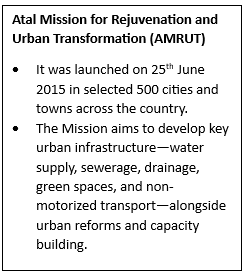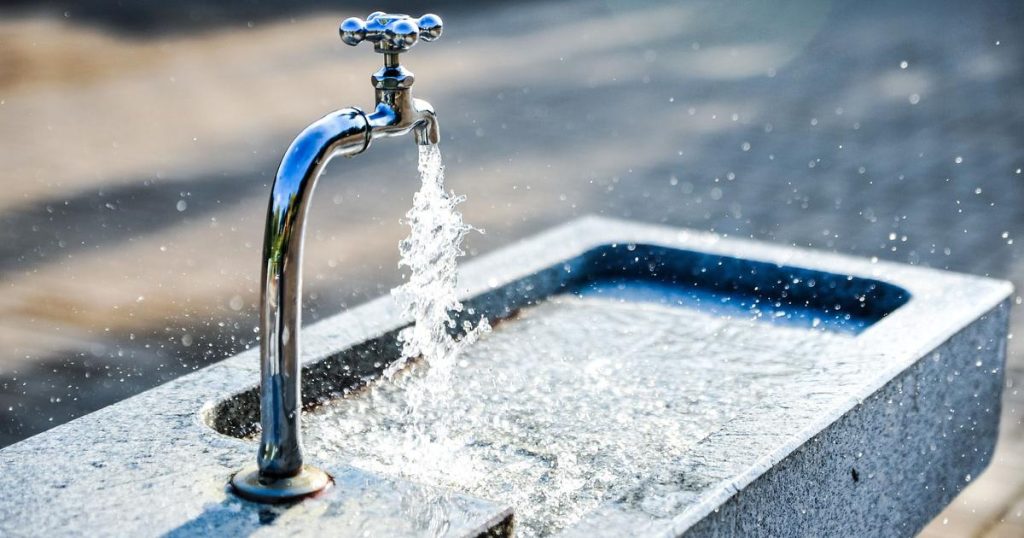Syllabus:
GS2: Government policies and interventions for development in various sectors and issues arising out of their design and implementation.
Context:
Tap water coverage crosses 81% in rural India; groundwater rises in 83 blocks as highlighted by the government data.
More on the News
- Over 15.68 crore rural households, accounting for 81% of the total 19.36 crore, now have tap water connections through the government’s flagship Jal Jeevan Mission (JJM).
- According to the Functionality Assessment 2022, 86% of households had working tap connections, 85% received adequate quantities of water, 80% had regular supply, and 87% received water meeting quality standards.
- Under AMRUT (Atal Mission for Rejuvenation and Urban Transformation), 189 lakh new or serviced water connections have been provided against a target of 139 lakh, while AMRUT 2.0 projects cover 407 lakh connections.
- The Atal Bhujal Yojana (ABY) is addressing groundwater depletion in 8,203 water-stressed gram panchayats across 229 administrative blocks in Gujarat, Haryana, Karnataka, Madhya Pradesh, Maharashtra, Rajasthan, and Uttar Pradesh.
Jal Jeevan Mission (JJM)
- Government of India had launched Jal Jeevan Mission (JJM), a centrally sponsored scheme in August 2019, aiming at providing Functional Household Tap Connection (FHTC) to every rural household by 2024
- It is be based on a community approach to water and will include extensive Information, Education and communication as a key component of the mission.
Objectives:

- To provide a Functional Household Tap connection (FHTC) to every rural household.
- To prioritize provision of FHTCs in quality-affected areas, villages in drought-prone and desert areas, Sansad Adarsh Gram Yojana (SAGY) villages, etc.
- To provide functional tap connections to Schools, Anganwadi centres, GP buildings, Health centres, wellness centres and community buildings
- To monitor the functionality of tap connections.
Components
- Decentralized Planning: Villages are empowered to design and execute their own water supply systems through Village Action Plans.
- Community Ownership: Local institutions such as Village Water and Sanitation Committees (VWSCs) are responsible for planning, implementation, and maintenance.
- Water Quality Monitoring: Over 24.80 lakh women have been trained to conduct water tests using Field Test Kits, making water safety a community-led effort.
- Sustainability: Water source sustainability and greywater management have been integrated to ensure long-term water security.
- Capacity Building: Widespread training and IEC (Information, Education, Communication) campaigns have fostered awareness and behavioural change
Funding Pattern:
- The fund sharing pattern between the Centre and states is 90:10 for Himalayan and North-Eastern States, 50:50 for other states, and 100% for Union Territories.
Atal Bhujal Yojana (ABY)
- Atal Bhujal Yojana is a groundwater management scheme aimed to arrest the decline in groundwater levels and improve groundwater management by involving community participation and line departments.
- It was launched on 95th birth anniversary of former Prime Minister Atal Bihari Vajpayee on 25 December 2019.
- Atal Bhujal Yojana is a central sector scheme worth Rs. 6,000 crore which aims for sustainable management of groundwater with community participation.
- It envisages people’s participation through the formation of water budgeting, preparation & implementation of Gram-panchayat-wise water security plans, etc.
- Implementation: It is being implemented by the Ministry of Jal Shakti (earlier known as Ministry of Water Resources, River Development and Ganga Rejuvenation).
- Funding Pattern: The scheme is being funded by the Government of India and the World Bank on 50:50 basis. The identified over-exploited and water-stressed areas for the implementation of the scheme are Gujarat, Haryana, Karnataka, Madhya Pradesh, Maharashtra, Rajasthan, and Uttar Pradesh.

